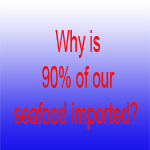
Oil Drilling on Georges Bank?
Canadians need help from US
Fishermen
By Denny Morrow
(Co-Chair, Norigs 2000)

Oil Drilling on Georges Bank?
Canadians need help from US
Fishermen
By Denny Morrow
(Co-Chair, Norigs 2000)
 |
 |
| The government of Nova Scotia and the
Canadian government in Ottawa will have to decide this summer whether the
legislation that has protected the Canadian portion of Georges Bank frorn
oil and gas exploration and development will be extended or allowed to
expire on Jan. 1, 2000.
The Canadian moratorium against oil and gas industry activity has protected the Canadian side of the bank since 1990. That moratorium resulted from a ground swell of opposition to oil and gas development from a coalition of fishing interests and environmentalists in the late 1980s. On the US side, the first petroleum moratorium on Georges Bank was promoted by fishing industry people together with groups like the Gloucester Fishermen's Wives Association, Conservation Law Foundation, Save the Harbor Save the Bay, Sierra Club, Massachusetts (MA) Audubon Society, MA Coastal Zone Management, the MA attorney general and governor, Gloucester Fisheries Commission, and many others. Greenpeace staged major protests with hundreds of people in support of fishing community representatives as they testified at public hearings for the moratorium. A similar ground swell is needed again Moratorium to expire Since late January, a three-person review panel has been reviewing over 80 written and oral presentations it heard during three weeks of hearings in Nova Scotia. Fishermen, processors, union officials representing plant workers, academics, and environmentalists spoke out strongly against letting the moratorium expire in over 50 of those presentations. Among those who offered testimony were three Americans: David Lincoln, who represented the Gloucester Fishermen's Wives Association and the Massachusetts Fishermen's Partnership; Priscilla Brooks for the Conservation Law Foundation; and Peg Brady for MA Coastal Zone Management. The Canadian Association of Petroleum Producers - oil companies like Texaco and Chevron - and offshore supply companies presented the case for the oil and gas industry. Norigs 2600 A Canadian fishing industry coalition - called Norigs 2000 - formed to fight for extension of the Canadian oil drilling moratorium. The coalition includes all the major fish packing associations, .fishermen's associations of all gear types, and unions for fish workers on the Canadian side. The Norigs 2000 coalition presented research from Norway and elsewhere which shows that seismic activity harms larvae and has a negative impact on fish behavior in the vicinity of seismic shooting. The coalition cited evidence that discharges of drilling muds, cuttings, and produced water can have a harmful effect on fish larvae and bottom-dwelling species like scallops and lobsters. It also pointed out the risk of major environmental damage from blowouts, pipeline leaks, and tanker accidents. Norigs representatives stressed the need for more research concerning the chronic long-term effects of small-scale spills of hydrocarbons and the release of produced water effluent into the ocean from production platforms. Fishermen spoke to the panel members about the potential of loss of access to traditional fishing grounds due to exclusion zones if oil and gas development is aliowed to proceed on the small portion of the bank that is owned by Canada. The Norigs position can be summarized by saying that Georges Bank is one of the world's great spawning grounds and nurseries for a wide variety of marine life. Fisheries threatened On the Canadian side of the bank, commercial landings have remained hi excess of $100 million at a time when fish stocks are rebuilding. NMFS statistics show that fishermen in the New England states who fish Georges Bank and the Gulf of Maine landed fish worth more than $500 million in 1997. Georges Bank is a highly sensitive area and must never undergo oil and gas development. During the summer of 1998, the American government announced that it would continue to protect the five-sixths of the bank owned by the US by extending its moratorium against oil and gas development until 2012. The American moratorium will be meaningless, however, if Canada allows its moratorium to expire. Strong currents circle Georges Bank and pollution on the Canadian side will spoil the American side as well. James Baker, US undersecretary of commerce, has joined Massachusetts senators and congressional representatives in expressing opposition to allowing the Canadian moratorium to expire. Oil industry offensive Since the hearings closed in late January, the oil and gas industry seems to be relying on an organization called the Offshore Technology Association of Nova Scotia (OTANS). This group claims 40,000 Nova Scotians as members. OTANS never says where these 40,00 people work or what their connection to the offshore petroleum industry is. OTANS is buying expensive media advertising and it is lobbying the politicians in Halifax and Ottawa to let the moratorium expire. The Georges Review Panel will likely render its recommendation to the two levels of government in June. If the moratorium is to be extended, both levels of government have to draft legislation and have it approved in the parliament of Canada and the legislative assembly in Nova Scotia. The Norigs coalition has been busy expressing its case to the politicians since the close of the panel hearings in January. Americans' role In order to win this fight to extend the Canadian moratorium until the year 2012 to coincide with the American extension, the Norigs coalition needs the help of American fishermen and all citizens who are concerned about protecting this sensitive area of the ocean from hydrocarbon development. Concerned Americans can write or call their politicians and ask them to register their opposition to oil and gas development on Georges Bank to the Canadian and Nova Scotian governments. Americans can also fax protest letters directly to Canadian politicians who will play an important role in the moratorium decision (see box blow). We must not forget the deep sacrifices Canadian and American fishing communities are making to rebuild resources on Georges Bank. Denny Morrow
|